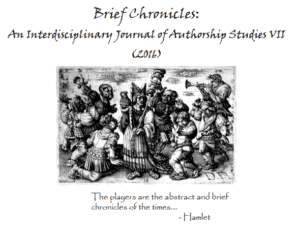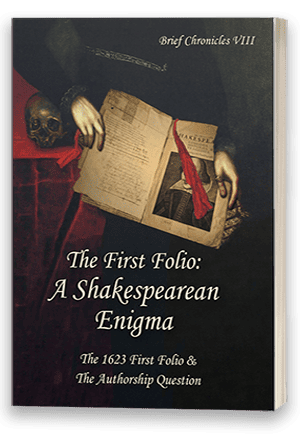Brief Chronicles
An Interdisciplinary Journal of Authorship Studies

Brief Chronicles (similar to The Oxfordian) was an annual peer-reviewed scholarly journal, published from 2009 to 2016, dedicated to examining the authorship question and various related topics in early modern studies. It was launched by the Shakespeare Fellowship, which merged with the Shakespeare Oxford Society in 2013 to form the Shakespeare Oxford Fellowship. It is included in the MLA International Bibliography and World Shakespeare Bibliography databases. While discontinued as an annual journal after 2016, it continues as an occasional series of scholarly books (more information here).
General Editor: Professor Roger Stritmatter, Ph.D., Coppin State University (Baltimore)
Managing Editor: Professor Michael Delahoyde, Ph.D., Washington State University (Pullman)
Other Brief Chronicles issues available for purchase on Amazon.com:
Vol. 7 Cover | Vol. 7 Articles
Editor’s Introduction by Roger Stritmatter ix – xii
Who Wrote the First Biography of Shakespeare? It was not Nicholas Rowe in 1709! by Kevin Gilvary 1-15
Greed and Generosity in the Shakespearean Question by Richard M. Waugaman 17-32
An Arrogant Joseph Hall and an Angry Edward de Vere in Virgidemiarum [1599] by Carolyn Morris 33-82
Teaching the Sonnets and de Vere’s Biography at School – Opportunities and Risks by Elke Brackmann and Robert Detobel 83-110
Oxford and The Arte of English Poesie by Richard Malim 111-130
Edward de Vere: Translator of Johan Sturm’s A Ritch Storehouse or Treasurie for Nobilitie and Gentlemen? by Richard M. Waugaman 131-146
Engaging Academia: Some Thoughts by James Warren 147-178
Exchange of Letters between James Warren and John Shahan 179-184
BC FF Cover | BC FF Full Journal
What’s Past is Prologue by Roger Stritmatter 1-3
Branding the Author: Feigned Neutrality and the Folger Folio Tour by Shelly Maycock 5-29
Shakespeare’s Impossible Doublet by John M. Rollett 31-46
“Look Not on this Picture”: Ambiguity in the First Folio by Richard Whalen 47-59
From Ben Jonson and Shakespeare (1921) by Sir George Greenwood 61-68
First Folio Fraud by Katherine Chiljan 69-87
“Bestow, When and How You List”: The de Veres and the 1623 Folio by Roger Stritmatter 89-93
Shakespeare’s Son on Death Row by William Boyle 95-102
Puzzling Shakesperotics by Roger Stritmatter 103-109
“Publish We This Peace” by Roger Stritmatter 111-115
Literary Criticism and the Authorship Question by James A. Warren 117-132
Looking Not on His Picture, but His Books A Review Essay by Michael Dudley 133-138
Vol. 6 Cover | Vol. 6 Articles
From the Pulpit: A Few Home Truths — A British Introduction by Alexander Waugh 1-8
Sisyphus and the Globe: Turning (on) the Media by Don Rubin 9-22
Biography, Genius, and Inspiration by Bernd Brackmann 23-32
Strat Stats Fail to Prove that ‘Shakspere’ is Another Spelling of ‘Shakespeare’ by Richard F. Whalen 33-50
Arms and Letters and the Name “William Shake-speare” by Robert Detobel 51-58
The Use of State Power To Hide Edward de Vere’s Authorship of the Works Attributed to “William Shake-speare” by James Warren 59-81
Chaucer Lost and Found in Shakespeare’s Histories by Jacob Hughes 83-105
A Midsummer Night’s Dream: Shakespeare’s Aristophanic Comedy by Earl Showerman 107-136
Mark Twain and “Shake-Speare”: Soul Mates by James Norwood 137-158
Ben Jonson and the Drummond “Informations”: Why It Matters by Richard Malim 159-172
Reviews:
Was William Scott a Plagiarist? A Review of Scott’s The Model of Poesie reviewed by Richard Waugaman 173-178
Dr. Magri’s Bow and Quiver: Such Fruits Out of Italy: The Italian Renaissance in Shakespeare’s Plays and Poems reviewed by William Ray 179-185
Towards a Pragmatechnic Shakespeare Studies: A Review-Essay on U. Cambridge’s Shakespeare and the Digital World reviewed by Michael Dudley 187-196
Vol. 5 Cover | Vol. 5 Articles
Preface: On Being Wrong by Michael Delahoyde 1-10
By Nature Fram’d to Wear a Crown? Decolonizing the Shakespeare Authorship Question by Michael Dudley 11-30
Shakespeare’s Five “Outlier” Sonnets by Alex McNeil 31-45
Betrayal in the Life of Edward de Vere & the Works of Shakespeare by Richard M. Waugaman 47-60
What Really Happens in Macbeth? An Originalist Reading by Richard F. Whalen 61-68
Lyric Poetry from Chaucer to Shakespeare by Michael Delahoyde 69-100
Comparative Caricatures in King John and Troublesome Raigne by Jacob Hughes 101-112
Bayesian Interrogation of the Elizabethan Social Network for First Folio Authorship by Stuart Nettleton 113-138
The Logical Basis of Oxford’s Troilus and Cressida by Michael Wainwright 139-169
Was Shakespeare a Euphuist? Some Ruminations on Oxford, Lyly and Shakespeare by Sky Gilbert 171-188
Reviews & Notes:
Shakespeare Beyond Doubt & Shakespeare Beyond Doubt? reviewed by Don Rubin 189-192
Shakespeare Beyond Doubt reviewed by Tom Regnier 193-204
AKA Shakespeare reviewed by Hanno Wember 205-213
The Oxfordian Macbeth reviewed by Felicia Londré 214-216
Vol 4. Preliminary Matter | Vol. 4 Articles
Epistle Dedicatory by Roger A. Stritmatter viii-xvii
The Chronicles of Hall and Holinshed: Published under Pseudonyms? by Kevin Gilvary 1-21
The Importance of Love’s Martyr in the Shakespeare Authorship Question by Katherine Chiljan 23-38
Did Tudor Succession Law Permit Royal Bastards to Inherit the Crown? by Thomas Regnier 39-58
The Scottish/Classical Hybrid Witches in Macbeth by Richard F. Whalen 59-72
Biblical Sources for Sonnets 24, 33, and Henry VIII: Implications for de Vere’s Authorship by Richard M. Waugaman 73-87
Triangular Numbers in Henry Peacham’s Minerva Britanna: A Study in Jacobean Literary Form by Roger Stritmatter 89-116
A Countess Transformed: How Lady Susan Vere Became Lady Anne Clifford by Bonner Miller Cutting 117-134
Reviews and Communications 135-141
Vol. 3 Complete Issue
Editor’s Greeting by Roger Stritmatter viii-xv
From the Foreword to This Star of England by C. O., Jr. (Charlton Ogburn, Jr. ) 1-8
Veering Toward an Evolutionary Realignment of Freud’s Hamlet by Michael Wainwright 9-36
Shakespeare’s Greater Greek: Macbeth and Aeschylus’ Oresteia by Earl Showerman 37-70
Commedia dell’arte in Othello: A Satiric Comedy Ending in Tragedy by Richard Whalen 71-106
The Law in Hamlet: Death, Property, and the Pursuit of Justice by Thomas Regnier 107-132
On the Authorship of Willobie His Avisa by Robert R. Prechter, Jr. 133-166
She Will Not Be a Mother: Evaluating the Seymour Prince Tudor Hypothesis by Bonner Miller Cutting 167-196
Shakespeare’s Antagonistic Disposition: A Personality Trait Approach by Andrew Crider 197-208
The Sternhold and Hopkins Whole Booke of Psalms: Crucial Evidence of Edward de Vere’s Authorship of the Works of Shakespeare by Richard Waugaman 209-230
Reviews and Interviews:
Shakespeare Suppressed reviewed by William Ray 231-240
Dating Shakespeare’s Plays: A Critical Review of the Evidence reviewed by Don Ostrowski 241-252
The Assassination of Shakespeare’s Patron: Investigating the Death of the Fifth Earl of Derby reviewed by Peter Dickson 253-258
Gary Goldstein interviews Leo Daugherty 259-263
Shakespeare The Concealed Poet reviewed by Bonner Cutting 267-269
Theater Of Envy: William Shakespeare reviewed by Heward Wilkinson 270-272
The Shakespeare Guide to Italy: Retracing the Bard’s Unknown Travels reviewed by Virginia Renner 273-278
Bardgate: Shake-speare and the Royalists Who Stole the Bard reviewed by Gary Goldstein 279-281
Anonymous reviewed by Sky Gilbert 282-287
Dialogue/Debate:
Vol. 2 Preliminary Matter | Vol. 2 Articles
Epistle Dedicatory by Roger A. Stritmatter viii-xvii
What’s in a Name? by Hugh Trevor-Roper 1-8
Shakespeare’s Impossible Doublet by John Rollett 9-24
Lily’s Latin Grammar and the Identity of Shakespeare by Nina Green 25-30
Illuminating Eclipses: Astronomy and Chronology in King Lear by Hanno Wember 31-42
Hundreth Sundrie Flowers Revisited: Was Oxford Really Involved? by Bob Prechter 43-76
An Accident of Note: Chapman’s Hamlet and the Earl of Oxford by Robert Detobel 77-105
Maniculed Psalms in the de Vere Bible: A New Literary Source for Shakespeare by Richard M. Waugaman 107-118
The Arte of English Poesie: The Case for Edward de Vere’s Authorship by Richard M. Waugaman 119-137
Cordelia’s Silence and Edgar’s Secrecy: Emblems of the Authorship Question in King Lear by Heward Wilkinson 139-166
The Earl of Oxford’s Office….Illuminated by Christopher Paul 167-207
Reviews:
Contested Will reviewed by Warren Hope 209-220
The Oxfordian Othello reviewed by Felicia Londré 221-222
Shakespeare and Garrick reviewed by Sky Gilbert 223-227
The Lame Storyteller reviewed by Warren Hope 229-233
Shakespeare’s Lost Kingdom reviewed by Michael Delahoyde 234-240
Shakespeare’s Lost Kingdom reviewed by Christopher Paul 241-254
Letters 255-265
Vol. 1 Complete Issue
Welcome to Brief Chronicles by Roger A. Stritmatter and Gary Goldstein 1-7
Censorship in the Strange Case of William Shakespeare by Winifred L. Frazer 9-28
The Psychology of Shakespearean Biography by Richard Waugaman 29-39
The Fall of the House of Oxford by Nina Green 41-95
Francis Meres and the Earl of Oxford by Robert Detobel, K.C. Ligon 97-108
Shakespeare’s Many Much Ado’s: Alcestis, Hercules, and Love’s Labour’s Wonne by Earl Showerman 109-140
Epicurean Time in Macbeth by Peter Moore 141-154
Edward de Vere’s Hand in Titus Andronicus by Michael Delahoyde 155-168
Shakespeare’s Will…Considered Too Curiously by Bonner Cutting 169-191
A Sparrow Falls: Olivier’s Feminine Hamlet by Sky Gilbert 193-204
How Shakespeare Got His Tempest: Another “Just So” Story by Roger Stritmatter and Lynne Kositsky 205-267
First Person:
Dramatizing Shake-Speare’s Treason by Hank Whittemore 267-275
Reviews:
The Shakespeare Controversy reviewed by Thomas Hunter 277-283
The Muse as Therapist reviewed by Richard Waugaman 283-285
The Man who Invented Shakespeare reviewed by Walter Klier 285-287
... they are the abstract and brief chronicles of the time. After your death you were better have a bad epitaph than their ill report while you live.
— Hamlet to Polonius about the players (act 2, sc. 2)
The Brief Chronicles mission statement quotes former Folger Shakespeare Library educational director Richmond Crinkley in a 1985 Shakespeare Quarterly review of Charlton Ogburn Jr.’s The Mysterious William Shakespeare: “Doubts about Shakespeare came early and grew rapidly. They have a simple and direct plausibility. The plausibility has been reinforced by the tone and methods by which traditional scholarship has responded to the doubts.” According to its mission statement, “Brief Chronicles solicits articles that answer Crinkley’s 1985 call for scholarship which transcends the increasingly irrelevant traditional division between ‘amateur’ knowledge and ‘expert’ authority [in Shakespearean studies].”

